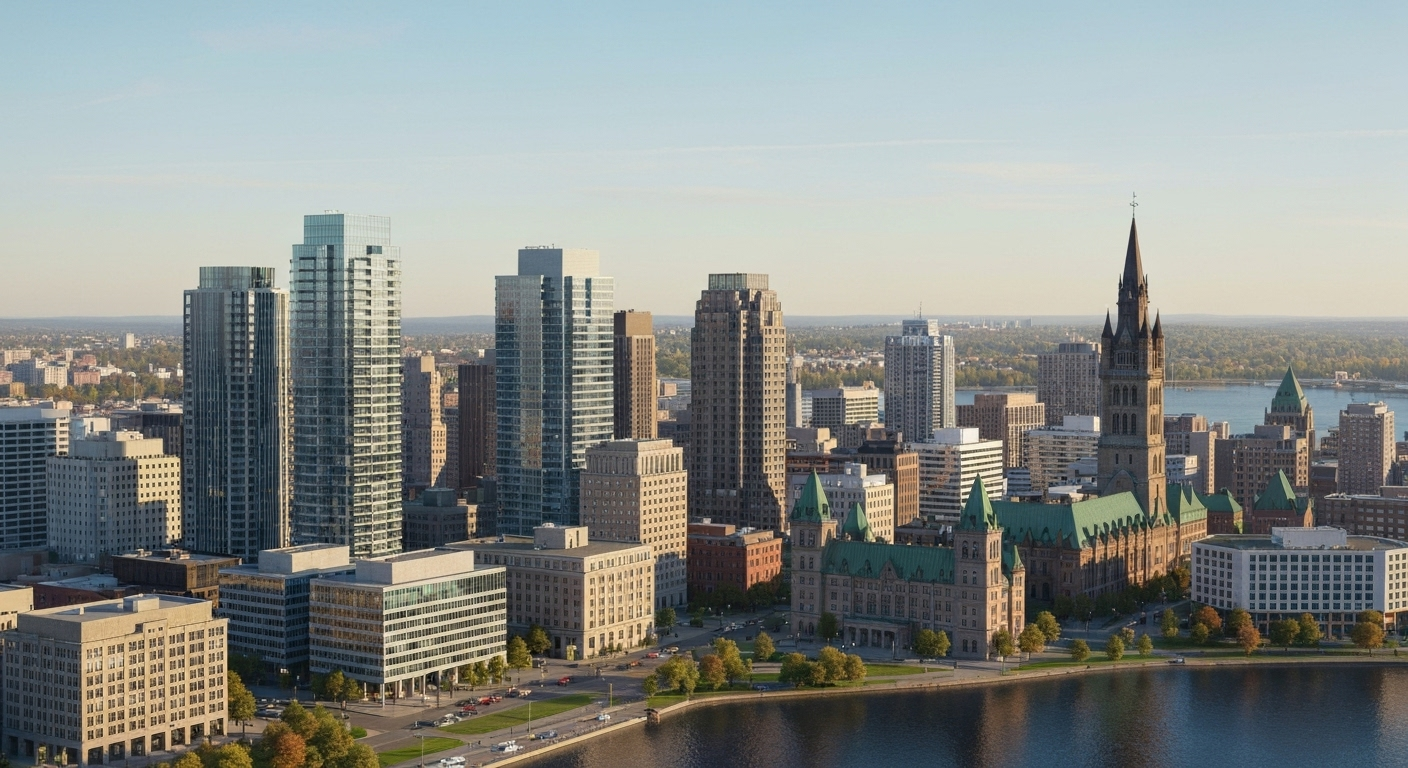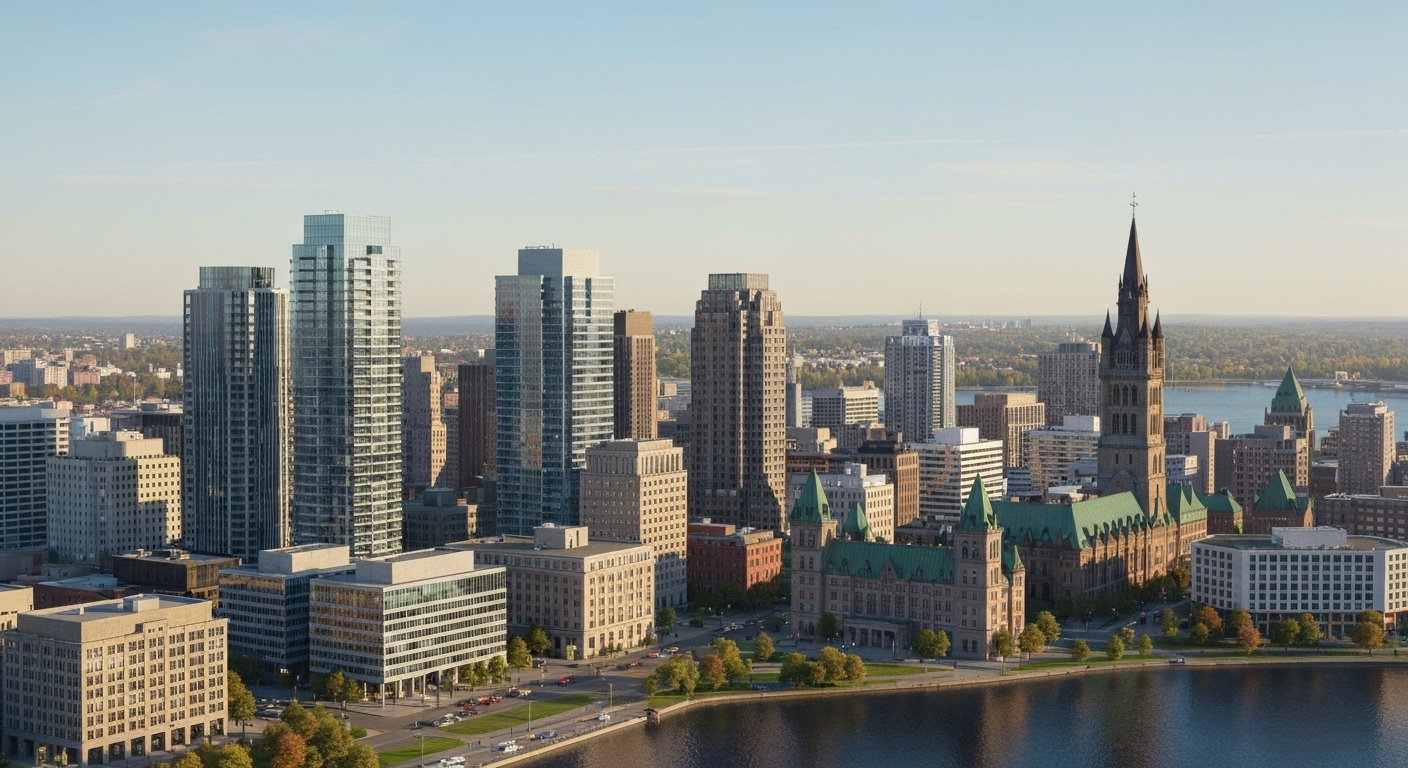
Ottawa Real Estate Market Update August 2025: Price Insights

Key Highlights
Here’s a quick look at the Ottawa real estate market for August 2025, according to the Ottawa Real Estate Board.
- The average price for all homes sold in August reached $682,025, marking a 4.4% increase from last year.
- Total home sales for the month were 891 units, showing continued market activity.
- Freehold house prices continued to climb, with the average price hitting $793,073, a 4.6% year-over-year increase.
- In contrast, the average price for condominiums saw a slight decrease of 0.9% compared to last year, settling at $413,977.
- The market shifted to a seller’s market, with the months of inventory dropping to 2.9 months.
Introduction
Welcome to your August 2025 update on Ottawa’s housing market! This month, the real estate landscape continues to show its unique character, balancing steady growth with some interesting shifts. While the market remains resilient compared to other Canadian cities, we’re seeing different stories unfold between property types. Are you curious about how freehold homes are performing against condos? Let’s explore the latest numbers and what they mean for you, whether you’re thinking of buying, selling, or just keeping an eye on your investment.
Ottawa Real Estate Market Overview for August 2025
Ottawa’s real estate market demonstrated notable stability in August, standing firm even as other regions face volatility. Factors like a stable, government-driven job market and consistent population growth help insulate the city from the pronounced slowdowns seen elsewhere. The market is showing signs of moderate growth rather than a significant decline.
This resilience doesn’t mean the market is static. Compared to national trends, Ottawa is charting its own course. We will look closer at the key trends and how this August compares to previous periods.
Key Highlights and Market Trends
Diving into the specific market trends for August, a key indicator is the months of inventory, which stood at 2.9 months. This figure suggests that the market has shifted in favor of sellers, meaning properties are selling faster than they were in the previous month, when inventory was at 3.2 months. This can impact consumer confidence, as buyers may feel more pressure to act quickly.
The data reveals a clear divergence in performance between different property types. This is one of the most significant trends worth monitoring for anyone active in the market.
Some of the standout trends include:
- Strong Freehold Growth: The average price for freehold properties, including single-detached homes, saw a healthy year-over-year increase of 4.6%.
- Condo Market Correction: The condominium segment experienced a slight price dip, with the average price falling by 0.9% compared to August of last year.
This split performance highlights how buyer preferences are shaping different segments of Ottawa’s real estate landscape.
Comparing August 2025 with Previous Months
Putting August’s performance into context requires looking back at previous months and the same time last year. The average home price in August 2025 was $682,025, which is a slight 1.1% dip on a month-over-month basis from July’s average of $689,770. This small decrease follows a typical seasonal pattern where activity can cool slightly in the late summer.
However, the year-over-year comparison tells a story of growth. The average price in August 2025 was 4.4% higher than in August 2024, when the average was $653,413. This indicates that despite minor monthly fluctuations, the market has gained significant value over the last year.
Here is a quick comparison of the average home prices:
|
Month |
Average Price |
Month-Over-Month Change |
Year-Over-Year Change |
|---|---|---|---|
|
August 2025 |
$682,025 |
-1.1% |
+4.4% |
|
July 2025 |
$689,770 |
-3.4% |
+2.2% |
|
August 2024 |
$653,413 |
-3.5% |
N/A |
Average and Benchmark Prices in Ottawa
Understanding the difference between average and benchmark prices is key to getting a full picture of the market. The average sale price in August was $682,025, a figure that can be influenced by a handful of very high or low sales. For a more stable view, real estate professionals often turn to the MLS® Home Price Index (HPI).
The most recently reported composite benchmark price for Ottawa was $633,100 in July. This benchmark represents a “typical” home in the area, helping to track underlying price trends more accurately. Below, we’ll examine the latest report data in more detail and analyze price movements across different timeframes.
Latest OREB Report Data Explained
The latest data from sources including the Ottawa Real Estate Board (OREB) offers valuable insights. In August, total home sales reached 891 units, comprised of 630 freehold homes and 261 condominiums. This activity shows a market that remains engaged, even with seasonal adjustments. The overall average price of $682,025 reflects a 4.4% increase from the previous year, reinforcing the market’s positive long-term trajectory.
Real estate professionals note that while the market is steady, it’s not uniform. Paul Czan, President of the Ottawa Real Estate Board, commented on this resilience, stating, “While we’ve seen demand may be softening in the condo market, especially in the downtown core, as a whole, Ottawa’s real estate market continues to stand out for its resilience and stability.” Source: https://www.oreb.ca/newsroom/signs-of-growth-amids-ottawas-steady-housing-market/
This expert commentary underscores the importance of looking beyond the headline numbers. The data shows that while some segments are experiencing price corrections, others are showing strong growth, creating a complex but fundamentally healthy market.
Month-Over-Month and Year-Over-Year Price Analysis
A deeper price analysis reveals the diverging paths of different property types. As mentioned, the overall average price saw a minor 1.1% month-over-month decline in August. This is a small adjustment, not a major downturn, and is common for the summer season. The more telling story is in the year-over-year figures, which highlight where the market’s strength truly lies.
Freehold properties continue to be the main driver of price growth. In contrast, the condominium market is undergoing slight price corrections, bringing its values down slightly from the previous year. This reflects a shift in buyer demand, possibly towards properties with more space.
Here’s a breakdown of the year-over-year average price changes by property type for August 2025:
|
Property Type |
Average Price (Aug 2025) |
Year-Over-Year % Change |
|---|---|---|
|
Freehold House |
$793,073 |
+4.6% |
|
Condominium |
$413,977 |
-0.9% |
|
Single Detached |
$922,821 |
+7.9% |
|
Townhouses |
$623,830 |
-0.5% |
Sales Volume and New Listings Activity
Beyond prices, the flow of home sales and new residential listings is crucial for understanding market dynamics. In August, the number of sold listings showed a market that is active but more measured than the frantic pace seen in previous years. This balance between buying and selling is key to a healthy market.
Inventory levels are a major part of this story. The supply of homes for sale affects everything from buyer choice to negotiating power. Let’s examine the specific number of homes sold and the current trends in inventory.
Number of Homes Sold in August 2025
In August 2025, a total of 891 residential properties were sold across the Ottawa region. This figure provides a clear snapshot of the market activity for the month. When you break it down, you can see where buyers are focusing their attention. The majority of these home sales were freehold properties, which accounted for 630 transactions. This represents an 8.8% increase in freehold sales compared to the same month last year.
Condominium sales also saw a slight year-over-year increase, with 261 units sold, up 1.6% from August 2024. This indicates that despite softening prices, there is still steady interest in the condo market.
While the total value of homes sold in August isn’t specified, July’s transactions reached approximately $920 million. Source: https://www.oreb.ca/newsroom/signs-of-growth-amids-ottawas-steady-housing-market/ This represents a huge contribution to the overall Ottawa economy and highlights the significant financial impact of the real estate sector.
Trends in New Listings and Inventory Levels
Inventory levels are a critical measure of supply in the housing market. At the end of August, there were 2,589 active residential listings available for sale. This supply, when measured against the pace of sales, gives us the “months of inventory.” For August, this figure was 2.9 months, which is a decrease from the 3.2 months recorded in July.
This drop in inventory is significant because it signals a shift from a more balanced market toward one that favors sellers. With fewer homes available relative to the number of buyers, competition can increase. This is a key trend for both buyers and sellers to watch closely.
Here are the key takeaways on inventory trends:
- Active Listings: The market had 2,589 homes for sale at the end of August.
- Months of Inventory: This measure of supply dropped to 2.9 months, indicating a seller’s market.
- Market Balance: The shift from July’s balanced market conditions suggests that demand is currently outpacing the available supply.
Conclusion
In conclusion, the Ottawa real estate market in August 2025 presents a complex landscape of trends and shifts. While we have seen fluctuations in average and benchmark prices, understanding the underlying data from the OREB report is critical for making informed decisions. The month-over-month changes in sales volume and new listings reveal a dynamic market that cannot be overlooked. Neighborhoods exhibiting the strongest year-over-year price growth are worth keeping an eye on, as they signal potential investment opportunities. As we navigate a period of rising inventory, it will be essential to monitor how these factors interplay with pricing trends through the end of 2025. If you’re looking to explore more about the Ottawa real estate market or need personalized insights, feel free to get in touch for a consultation!
Frequently Asked Questions
Which Ottawa neighborhoods showed the greatest price growth in August 2025?
The available data for Ottawa’s housing market focuses on property types rather than specific neighborhoods. While we can’t pinpoint individual areas, certain home styles like single-detached and split-level houses showed very strong price growth across the region compared to last year, indicating high demand for these types of properties.
Why are apartment prices declining while townhouse prices are rising?
The real estate market is seeing a shift in buyer preferences. The condo market is experiencing price corrections due to softer demand, especially in the city center. While August data shows a slight dip in townhouse prices, they have generally been in high demand as they offer more space than a condo, creating a more balanced market segment.
How might rising inventory impact Ottawa home prices through the end of 2025?
If inventory levels begin to rise again, this measure of supply would give buyers more choices and negotiating power. According to the Ottawa Real Estate Board, higher inventory can lead to a more balanced market. This could result in slower price growth or minor price corrections as supply and demand level out.
What factors are causing apartment prices to decline while townhouses rise?
Apartment prices are declining primarily due to a softening of demand, particularly in the downtown core condo market. This shift in buyer preference is leading to price corrections for condominiums, with the average price for a condo down 0.9% year-over-year in August. Conversely, townhouses have generally seen strong demand as they offer a middle ground between condos and more expensive single-family homes, although August data showed a minor dip of 0.5% year-over-year, contrasting with strong gains seen in previous months.
